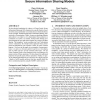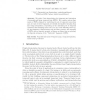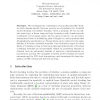101
Voted
ICTAC
2007
Springer
15 years 9 months ago
2007
Springer
LTL cannot express the whole class of ω-regular languages and several extensions have been proposed. Among them, Quantified propositional Linear Temporal Logic (QLTL), proposed b...
126
Voted
IPPS
2007
IEEE
15 years 9 months ago
2007
IEEE
A compositional method for estimating software reliability of many threaded programs is developed. The method uses estimates of the reliability of individual modules and the proba...
130
Voted
QEST
2008
IEEE
15 years 9 months ago
2008
IEEE
We present a new version of PROBDIVINE – a parallel tool for verification of probabilistic systems against properties formulated in linear temporal logic. Unlike the previous r...
122
Voted
SACMAT
2009
ACM
15 years 9 months ago
2009
ACM
We develop the foundations for a theory of Group-Centric Secure Information Sharing (g-SIS), characterize a specific family of models in this arena and identify several direction...
116
click to vote
FSTTCS
2009
Springer
15 years 9 months ago
2009
Springer
Linear temporal logic was introduced in order to reason about reactive systems. It is often considered with respect to infinite words, to specify the behaviour of long-running sys...
105
Voted
CSL
2009
Springer
15 years 9 months ago
2009
Springer
We study Craig interpolation for fragments and extensions of propositional linear temporal logic (PLTL). We consider various fragments of PLTL obtained by restricting the set of te...
115
Voted
LATA
2009
Springer
15 years 9 months ago
2009
Springer
Abstract. We consider policies that are described by regular expressions, finite automata, or formulae of linear temporal logic (LTL). Such policies are assumed to describe situat...
145
Voted
VMCAI
2010
Springer
15 years 9 months ago
2010
Springer
This paper upgrades Regular Linear Temporal Logic (RLTL) with past operators and complementation. RLTL is a temporal logic that extends the expressive power of linear temporal logi...
127
Voted
ICSE
2004
IEEE-ACM
16 years 2 months ago
2004
IEEE-ACM
We describe an efficient decentralized monitoring algorithm that monitors a distributed program's execution to check for violations of safety properties. The monitoring is ba...
134
Voted
CADE
2002
Springer
16 years 3 months ago
2002
Springer
Abstract. We investigate the combination of propositional SAT checkers with domain-specific theorem provers as a foundation for bounded model checking over infinite domains. Given ...




